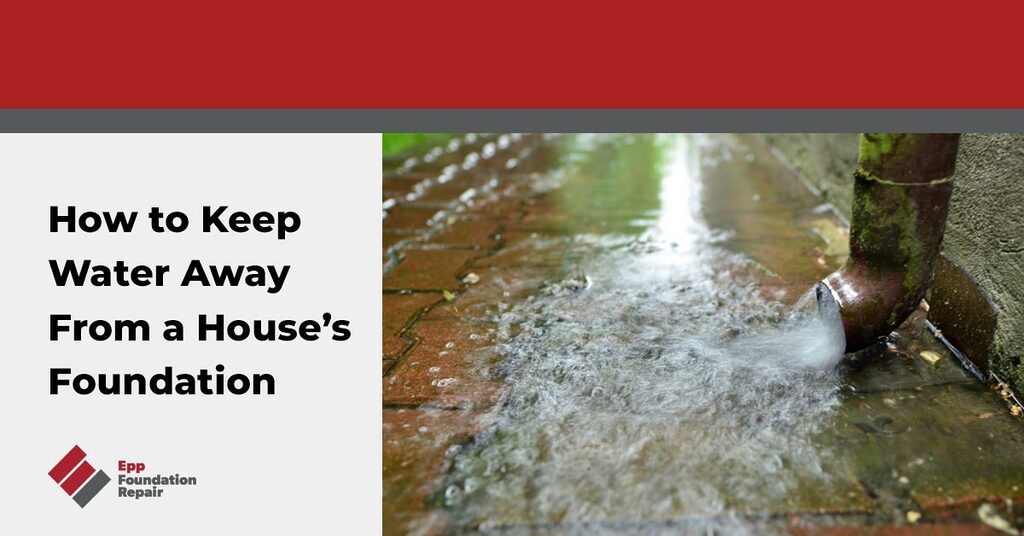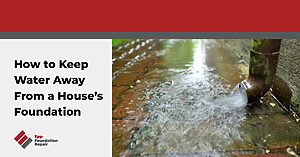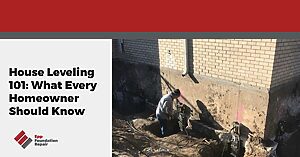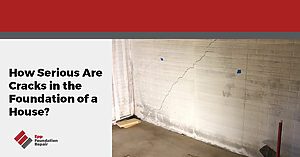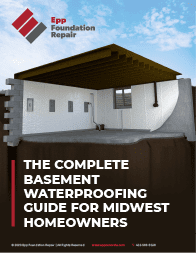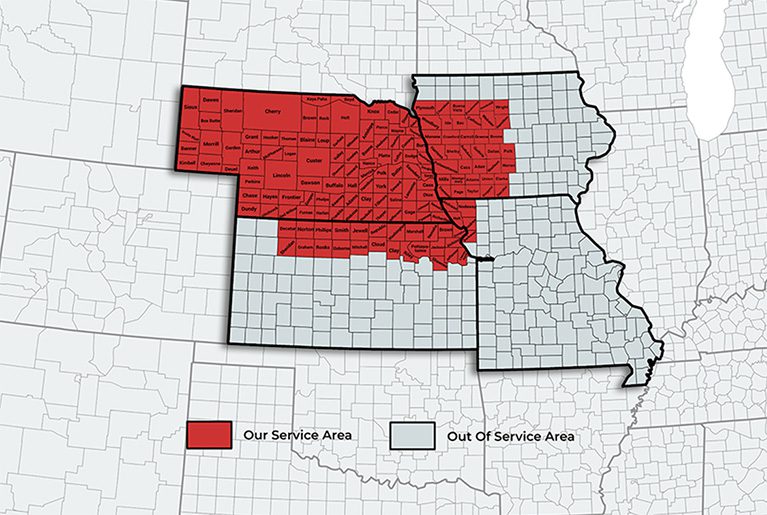Are you wondering how to keep water away from a house’s foundation? If so, you’re in the right place. Foundations are essential because they hold up your house, literally. They can also be expensive to fix. So, prevention is crucial, and part of that prevention means keeping water away from the foundation.
This article is going to cover why water causes most foundation problems, signs you might have a problem with excess water around your home’s foundation, and how to keep water away from a house’s foundation.
Water Causes Most Foundation Problems
Many homeowners are surprised to hear that water is the number one cause of foundation trouble. However, it’s true, especially when the house sits atop soil with a high percentage of clay.
Clay-rich soil is called “expansive soil” because it expands when it soaks up moisture and shrinks when it releases moisture and dries out. This seasonal swelling-shrinking cycle creates movement under the foundation as the soil expands and contracts. Over time, this leads to a phenomenon called “differential settlement,” where the home settles into the soil unevenly.
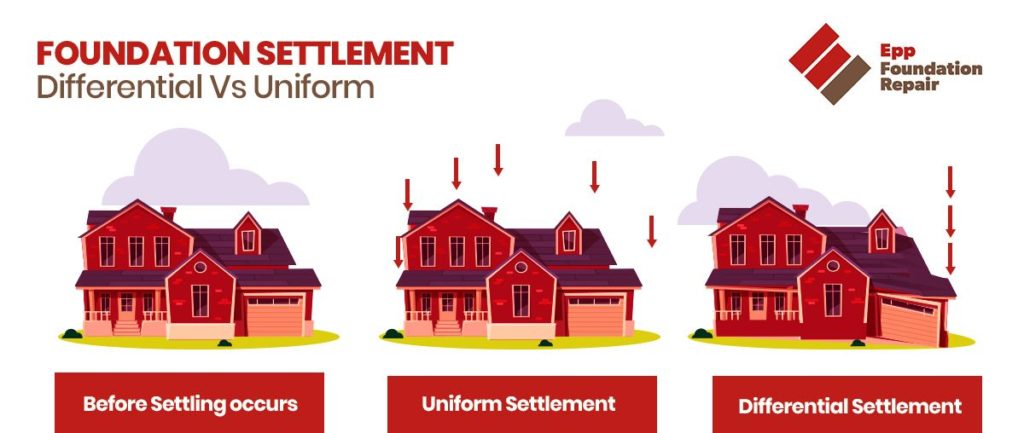
Water can also cause problems for foundations built atop soil prone to erosion. The soil washes away, voids form under the foundation, and this also causes differential settlement.
Differential settlement is a leading cause of structural damage. If your home is experiencing differential settlement, you might have wall cracks, floor cracks, cracks above windows and doors, trouble opening windows and doors, stair step cracks in brick, etc. This is happening because the house’s frame is out of kilter.
Other ways water causes foundation problems include those caused by hydrostatic pressure. When water in the soil around the foundation can’t drain off, hydrostatic pressure builds up and starts pushing against the foundation walls. Hydrostatic pressure can cause foundation walls to bow inward and even crack. Hydrostatic pressure can also push water through invisible cracks in a foundation wall.
How to Keep Water Away From a House’s Foundation
Since water causes most foundation problems, you can help prevent foundation trouble by making sure excess water can’t build up in the soil without a way to drain off. You can do this by regrading your yard, installing a drain tile system, cleaning your gutters regularly, using downspout extensions, installing an underground downspout, keeping water-hungry plants away from the foundation, installing a French drain in your yard, not using edging around landscaping, and keeping around 6 inches of your foundation exposed.
Here are some ways to do that:
- Install a drain tile system – When it comes to controlling groundwater, a drain tile system is a gold standard. A drain tile system – which includes a sump pit and sump pump – prevents excess water from accumulating in the soil around the foundation. For more information, see How Does A Drain Tile System Work?
- Regrade your yard – If the yard around your home slopes toward the foundation, have it regraded by a landscaping professional. The yard should slope away from the foundation 6 inches for every 10 feet.
- Clean your gutters – Clogged gutters prevent water from being channeled into the downspouts and released away from the foundation. Instead, water spills over the side of the house and soaks into the soil around the foundation.
- If your downspouts are short, install extensions – Short downspouts release water too close to the foundation. Extensions are easy to install and carry water away from the foundation before releasing it.
- Install an underground downspout along with a pop-up emitter – Water flows into the underground downspout and gets channeled toward the pop-up emitter, situated at least 10 feet from your foundation. The pop-up emitter sits flush with the ground and is barely visible. However, when it fills with water, it pops up and releases it.
- Don’t plant water-hungry shrubs and flowers near the foundation – Watering them will just add more water to the soil around the foundation. Keep them at least two feet away.
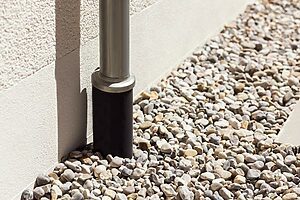
- Install a French drain in your yard – A French drain works similar to a drain tile system. However, instead of being installed around the foundation, it’s situated in your yard. Water flows into the buried, perforated drain pipe and gets channeled away from the yard and foundation.
- Don’t use edging around landscaping – Edging traps water allowing it to build up in the soil around the foundation.
- Keep around 6 inches of your foundation exposed – Don’t completely cover your house’s foundation with vegetation. Shrubs can grow big and prevent the house from drying leading to the formation of mold and mildew. Some of the foundation should be exposed to ensure it’s not buried in moisture which encourages termite infestation (You won’t know it’s there because you can’t see the foundation) and wood rot. Prowlers can also hide in overgrown shrubs.
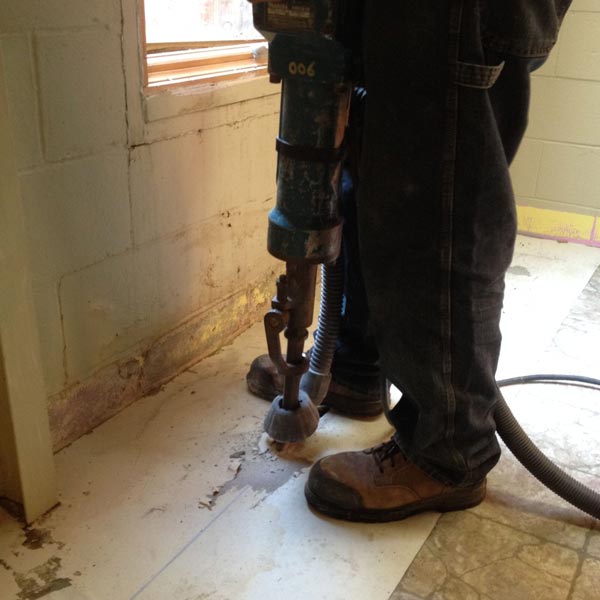
Signs You Might Have a Drainage Problem Around Your Home’s Foundation
A drainage problem around your home’s foundation doesn’t necessarily mean standing pools of water in your basement, crawl space, or yard. Your yard might just seem soggy. Other signs to watch out for include:
- Efflorescence on basement walls – Efflorescence is basically dried salt. It looks chalky and is a sign of moisture in concrete.
- Clogged gutters that allow water to flow over the side of the house.
- There’s a musty smell in your basement or home.
- Visible mold growth.
- There’s excess moisture in your basement or crawl space. Does the space feel humid? Is water tricking down the wall?
- There are water stains in the basement or crawl space.
- Your basement wall is bowing inward. It might even be cracked. This is a sure sign hydrostatic pressure has built up outside the foundation wall due to poor drainage. This can also happen to crawl space foundation walls.
Both old and new homes can have drainage problems. However, it’s probably less common with newer homes since drain tile systems are now often added during construction.
If you’re struggling to keep water away from your house’s foundation and you’re in our service area in Lincoln, Omaha, Grand Island, Kearney, Nebraska, Missouri, Iowa and parts of Northeastern Kansas, contact us today for a repair estimate.

